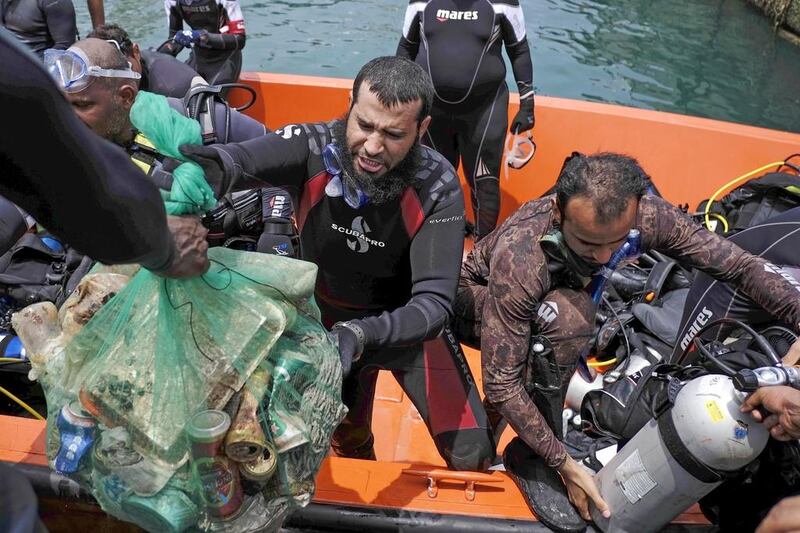ABU DHABI // Scuba divers plunged the depths of the city’s ports yesterday in an attempt to break the record for the world’s largest underwater clean-up.
Organised by Abu Dhabi Ports Company together with Abu Dhabi Marine Operating Company, the clean-up covered Abu Dhabi’s Free Port, the New Free Port, the nearby Fisherman’s Port, Zayed Port and Das Island.
The effort, which took place over the course of 24 hours, started in the early hours of yesterday morning.
The goal, said organisers, was to secure the participation of 250 certified divers by this morning as they claimed this would be a world record.
The clean-up also aimed to raise awareness of the negative impact of underwater debris.
According to information from the National Park Service in the United states, a plastic drinks bottle would need 450 years to decompose in the ocean, while even items as harmless as a paper towel could take up to four weeks.
By midday yesterday, 214 volunteers had already registered.
Among them was Lee Becker, 36, an ice hockey equipment manager from Abu Dhabi.
This was the first underwater clean-up for the Canadian, who first took-up diving 18 months ago.
“There was a lot of big waste where we were,” said Mr Becker, referring to large vehicle tyres and old metal pipes, he had seen underwater.
While he could not haul the bulky items – a job volunteers were instructed to leave for a professional crew – he surfaced with a bag full of plastic debris and disused fishing lines and netting.
Mr Becker thought some of waste must have come from ships visiting the port but believed members of the public were also guilty of littering the ocean, he said.
“You see a fair bit [of waste] and being on boats, you see a bit of carelessness there too, unless it is enforced by the diving centre,” he said.
“I see a lot of plastic bottles and bags, it seems wherever humans are going, everything is just dropping there,” he said.
Amjad Elabed, a 44-year-old engineer, also living in the capital, said he returned from his dive with “a lot of bottles, some old clothes and some [plastic] bags”.
Mr Elabed was one of 10 people who represented the recreational diving club of the Abu Dhabi Company for Onshore Oil Operations.
Dana Wessam, 27, had travelled from Dubai to take part in her seventh underwater clean-up and a third in this same location.
“I like this,” said the Egyptian, explaining she had had to take a day off from work to be part in the event.
Many of those taking part were UAE nationals, such as Said Mohammed, 28, and his colleague, Ali Hamodi, 37, both working for the Armed Forces.
“We just wanted to join for our country,” said Mr Mohammed. “It is exciting.”
For diving instructor, Anna Furer, 33, it was the participation of UAE nationals such as Mr Mohammed and Mr Hamodi, that was one of the highlights of the clean-up.
“It was really nice that there were so many local people,” said Ms Furer, an employee of the Abu Dhabi-based, Al Mahara Diving Centre, who was welcoming divers on one of several boats engaged in the clean-up.
“I love the motivation. I am so happy so many people are coming and showing that they care,” she said.
Joining the clean-up effort, within 20 minutes this reporter had collected from the ocean floor two glass bottles, a plastic cup, an aluminium beverage can, a piece of plastic sheet and another large piece of thick plastic, as well as an empty toothpaste container and the sole of a shoe.
vtodorova@thenational.ae





